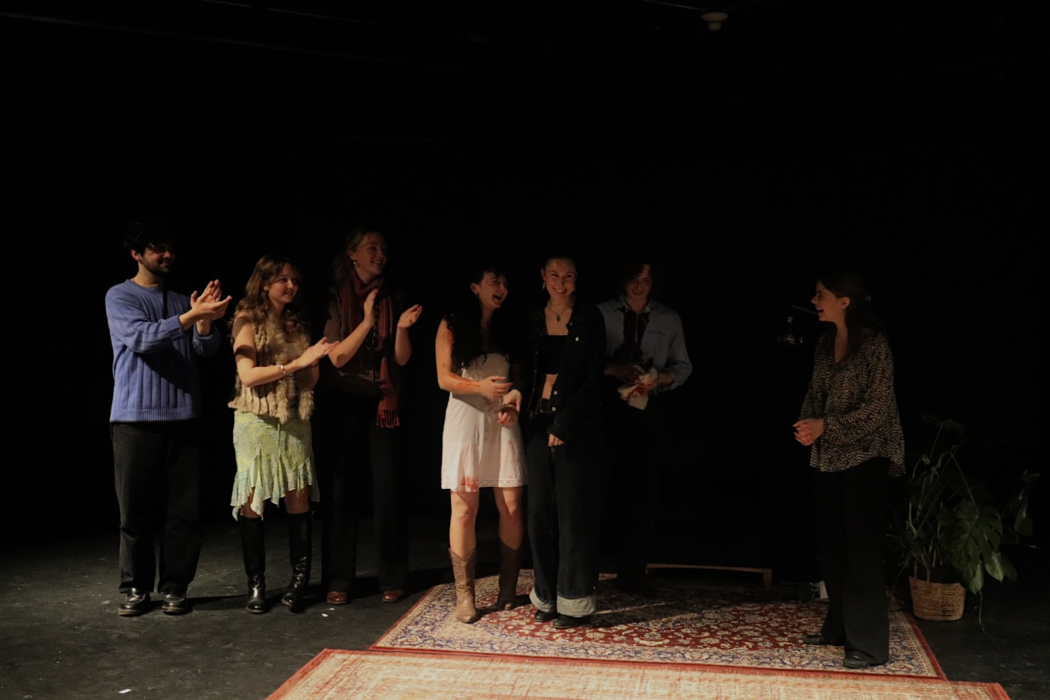HER: “It never hurt you like it hurt me”
— Yerma, Simon Stone
Two halves of a millennial couple, a feminist blogger and her financier boyfriend, sit on the floor of their newly bought home in a trendy London suburb. Over a bottle of champagne, they exchange dry witticisms about gentrification and the politics of body hair. Masking their vulnerability with light-hearted irony, they dance gingerly around their deepest anxieties and desires. Through a series of winking hints, the woman tentatively proposes that they have a child, and her boyfriend is shocked (“I thought you hated babies”—“I do!”). But they have the extra room now, don’t they? And isn’t it practically their social duty, as “two open-minded, liberal, caring individuals,” to procreate?
Exactly what causes the onset of this sudden motherly impulse is never clarified in Yerma. But the questions asked by its first scene capture in embryo the forces whose growth will propel the drama from its calamitous climax to its tragic end. Why do we want the things we want? Are our desires our own? How much strain can a relationship bear? And, most importantly, how have our purportedly progressive views on reproduction and motherhood continued to fail us? How does our culture continue to place women in impossible, mania-inducing binds?
By turns mordant and devastating, Yerma (2017) is Simon Stone’s adaptation of Federico Garcia Lorca’s 1934 tragedy of the same name. Swapping the insularity of a rural Spanish village with the hip, liberal elite of present-day London, the play follows one woman’s desperate attempts to conceive as her desire bleeds into an all-consuming obsession. Yerma is an unflinching portrait of the cruelty, selfishness, restriction, and pain at the heart of the modern family. A testament to what hasn’t changed in the eighty-odd years since Garcia Lorca’s original production, the play reveals how misogyny is still violently thriving under the guise of well-meaning, liberal progressivism.
The tortured intimacy they share is so believable that watching them makes one feel every bit the voyeur.
Under the direction of Ruby Isaacs, Yerma roared to thrilling, unrelenting life at McGill’s Players’ Theatre this November. Stellar performances by Odessa Rontigiannis (Her) and Hayden Jackson (John) charged the play’s central current with breathtaking magnetism. Rontigiannis undoubtedly steals the show, striking an improbable balance between sly wit and screaming sincerity. In the heat of a fight, John accuses Her of “eating up all the oxygen” in their relationship—and this is precisely what it felt like to sit in the audience. It was like the air had been sucked out of the room. You couldn’t look away if you tried. Jackson’s portrayal of the boyfriend does stunning justice to the messy knot of care and resentment lodged at the center of their relationship, flipping from quiet care to impassioned spite with eerie and impressive ease. The tortured intimacy they share is so believable that watching them makes one feel every bit the voyeur.
In fact, between the protagonist’s unfiltered blogging and her airy, glass-walled apartment, Yerma’s blurring of the public and the private might be its most prescient feat. Underscored by a minimal but highly evocative staging by Cypress Zufferli, the play shows how the internet’s erosion of boundaries and the atomization of social life casts its characters in a binding paradox.
An extraordinary supporting cast fleshes out the professional, family, and (ex)romantic life of the unnamed protagonist, adding to the play’s ambitious goal of blending the intensely personal and broadly cultural facets of sex and reproduction. Director Ruby Isaacs’ flawless execution made it all look easy.
Isaacs, who has previously directed Lucy Prebble’s The Effect for Tuesday Night Café Theatre, kindly shared some insights with me about the play’s content and opened up about her experience directing it.
* * *
You mention in your director’s note that Yerma reminded you of your family and friends, specifically watching them grapple with reproductive crises. What was it about Simon Stone’s adaptation that struck you as instantly recognizable, prescient, or relevant? And what was it like directing something so emotionally resonant?
I wanted to direct Yerma because it felt personal and pressing to the people I love. We also live in a time when reproductive rights are on the table for discussion, not just in America. I’ve seen firsthand with friends how hard it is to organize an abortion or get the morning-after pill in the UK. I think any play which discusses women’s bodies so explicitly and frankly is radical. But more than that, Simon Stone’s adaptation is timeless to me because of the characters. The way he dissects relationship dynamics and his understanding of the complexities of womanhood, I think, will always be relevant.
In your director’s note, you write, “I hope you watch this play and learn something about a woman you love.” What messages about womanhood and motherhood did you picture audiences leaving with? And what did you learn in the process of directing it?
I think emotional things like Yerma resonate with everyone differently, so I don’t know if there was one specific message. I had someone I knew in the audience every night, and one night someone was crying, or the next day someone would be like, ‘Oh, that reminds me of this one guy I liked.’ Just different things that always surprised me. [. . .] My family has a history with infertility and I wanted to explore what women I loved had experienced. I think I learned a lot about relationships under stress. I looked at this study in the lead-up to directing about how different couples handled fertility struggles during IVF, and it said unsuccessful straight couples almost always broke up. It just made me think about my parents, who I have always seen as such a power duo. I remember after opening night my father was like, ‘We had so many of those arguments surrounding IVF.’ It just really felt like I got to know my parents differently.
Last year, you directed The Effect, a play about a drug-trial romance. Like Yerma, it addresses the cultural consequences that modern medicine has on our personal lives. What do you think the two plays have in common? Is there something about this type of story that appeals to you?
[…] To be honest, I never thought about the two plays that way but it makes sense. I think I’ve always been interested in addiction; last year I was fascinated by the connections between love and addiction in The Effect. With Yerma, one of the questions we discussed very early on was: is she obsessed/addicted to the idea of having a child or does it come from within her as a natural impulse? I think neither Odessa nor I fully decided one or the other. The tragedy of the play is that maybe that’s both.
While undoubtedly a haunting drama, Yerma is also at times a whip-smart black comedy. What role do you think its humour plays? How did you calibrate its effects to suit the play’s message?
It was really the kindness of the people involved that made us able to balance humor and heaviness. It was like that on and off stage. We’d finish a rehearsal about postnatal depression and then have to dance to Fred Again, just to feel like we were leaving that sadness behind. I don’t think I’ve ever laughed so much directing a play; we all bonded so instantly it was like a support system was immediately there. I think the play works in the same way; you need the humor to make the sadness bearable.








